7 Best Herbal Tinctures For Anxiety
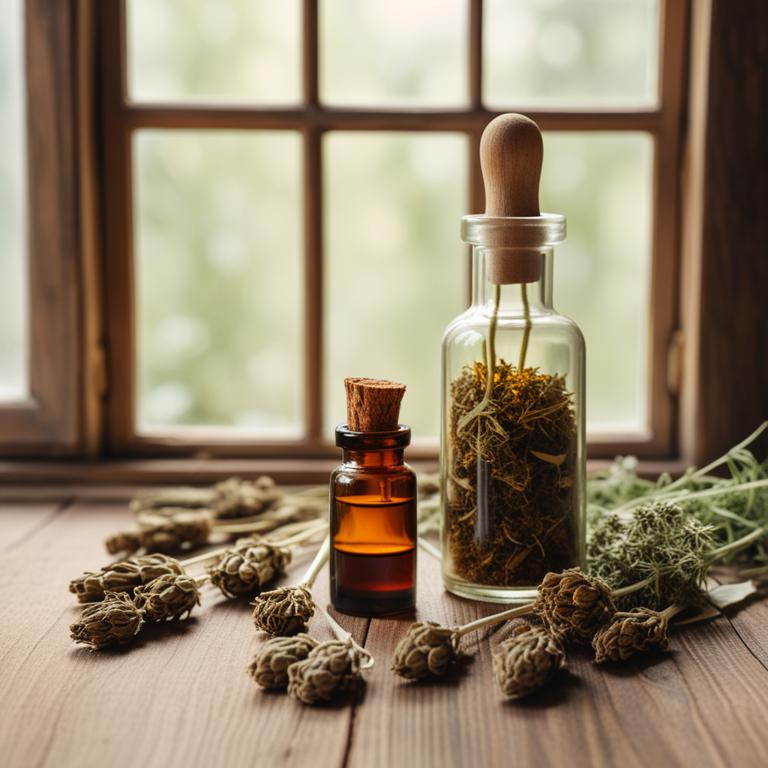
Herbal tinctures for Anxiety are liquid extracts made from plants that have been traditionally used to calm and soothe the mind and body, providing a natural alternative to pharmaceutical treatments.
These herbal remedies have numerous benefits, including reducing stress and anxiety levels, promoting relaxation, and improving sleep quality.
Examples of herbal tinctures used to treat anxiety include ashwagandha, which helps to regulate cortisol levels and promote balance; valerian root, which induces relaxation and calms the nervous system; chamomile, which soothes and calms the mind and body; lavender, which promotes relaxation and reduces anxiety; passionflower, which calms the nervous system and reduces anxiety; and kava, which reduces anxiety and promotes relaxation.
By incorporating these herbal tinctures into a daily routine, individuals can experience a reduction in anxiety symptoms and improve their overall well-being.
According to "Current pharmaceutical biotechnology", tinctures for anxiety made from valerian, passion flower, kava, St John's wort, and ginseng (also known as hwagandha) have shown positive results in clinical studies.
Below there's a list of the 7 best herbal tinctures for anxiety.
- 1. Passiflora incarnata tinctures
- 2. Valeriana officinalis tinctures
- 3. Avena sativa tinctures
- 4. Lavandula angustifolia tinctures
- 5. Melissa officinalis tinctures
- 6. Panax ginseng tinctures
- 7. Schisandra chinensis tinctures
Also you may be interested in...
TODAY'S FREE BOUNDLE
Herb Drying Checklist + Herbal Tea Shopping List + Medicinal Herbs Flashcards
Enter you best email address below to receive this bundle (3 product valued $19.95) for FREE + exclusive access to The Aphotecary Letter.
$19.95 -> $0.00
1. Passiflora incarnata tinctures
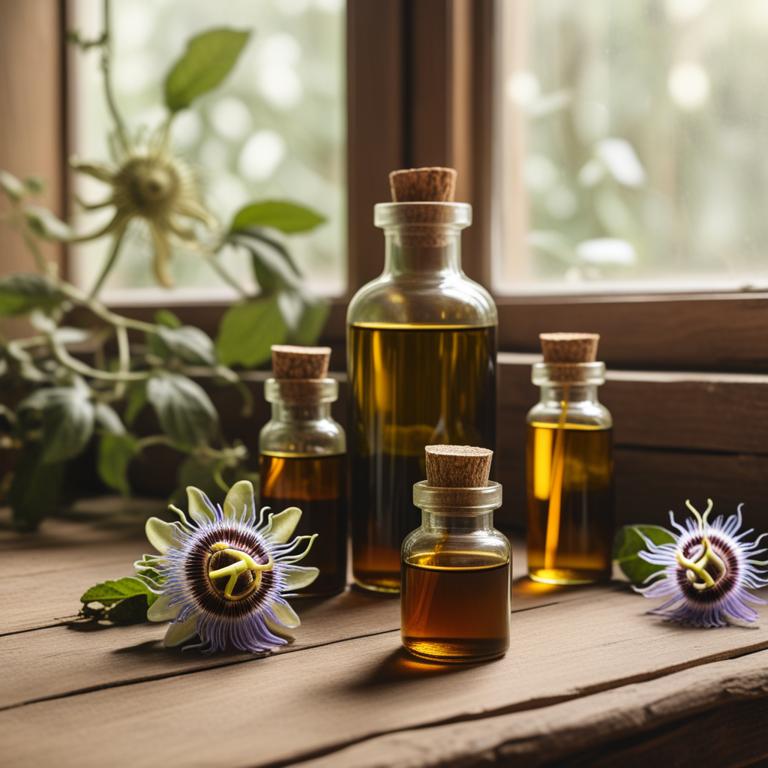
Passiflora incarnata tinctures have been traditionally used to treat anxiety by promoting relaxation and reducing stress levels.
The herbal preparation's anxiolytic properties help to calm the mind and body, making it easier to manage anxiety symptoms.
The bioactive constituents, including flavonoids, alkaloids, and glycosides, interact with the brain's neurotransmitters to regulate emotional responses and promote feelings of calmness.
By using Passiflora incarnata tinctures, individuals can experience benefits such as reduced anxiety, improved mood, and enhanced sleep quality, making it a natural and effective remedy for anxiety relief.
Related Study
According to "TheScientificWorldJournal", Passiflora incarnata tinctures for anxiety may be beneficial due to its anxiolytic activity, with P. incarnata being the most studied and used species in natural anxiolytic herbal medicine formulations.
2. Valeriana officinalis tinctures
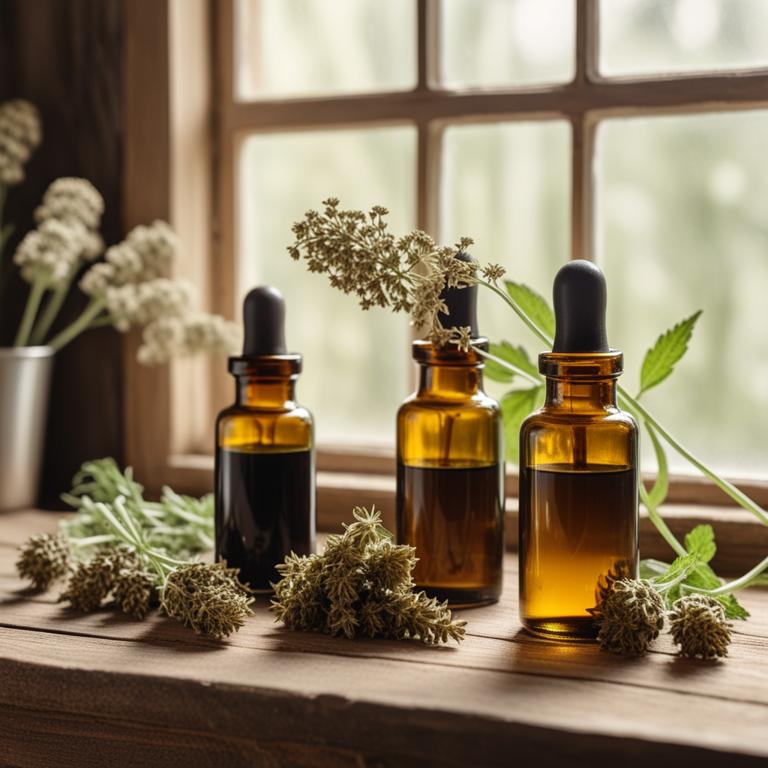
Valeriana officinalis tinctures, derived from the root of the valerian plant, have been used for centuries to treat anxiety due to their sedative and anxiolytic properties.
This herbal preparation helps to treat anxiety by promoting relaxation, reducing stress levels, and regulating sleep patterns, allowing individuals to feel calm and centered.
The bioactive constituents of valerian root, including valerenic acid and isovaleric acid, contribute to its anxiolytic effects by interacting with the GABA receptor and modulating the activity of neurotransmitters such as serotonin and dopamine.
Regular use of Valeriana officinalis tinctures has been shown to provide numerous benefits, including improved sleep quality, reduced symptoms of anxiety and depression, and enhanced overall well-being.
Related Study
According to "Current pharmaceutical biotechnology", Valeriana officinalis tinctures for anxiety showed promising effects based on clinical studies, which demonstrated positive results.
3. Avena sativa tinctures
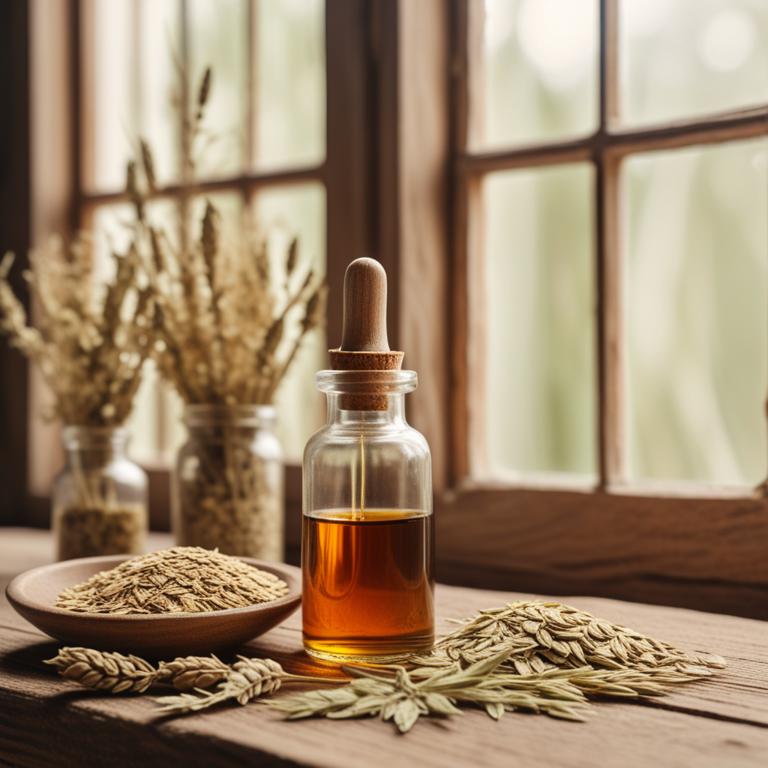
Avena sativa tinctures are a natural herbal preparation that has been used to treat anxiety due to its soothing and calming properties.
The tincture's ability to promote relaxation and reduce stress levels is attributed to its bioactive constituents, including avenacosides and avenalol, which have been shown to have anxiolytic effects.
By interacting with the body's GABA receptors and promoting the production of neurotransmitters such as serotonin and dopamine, Avena sativa tinctures help to calm the nervous system and alleviate anxiety symptoms.
Regular use of Avena sativa tinctures has been reported to provide benefits such as reduced anxiety levels, improved sleep quality, and enhanced mood stability.
4. Lavandula angustifolia tinctures
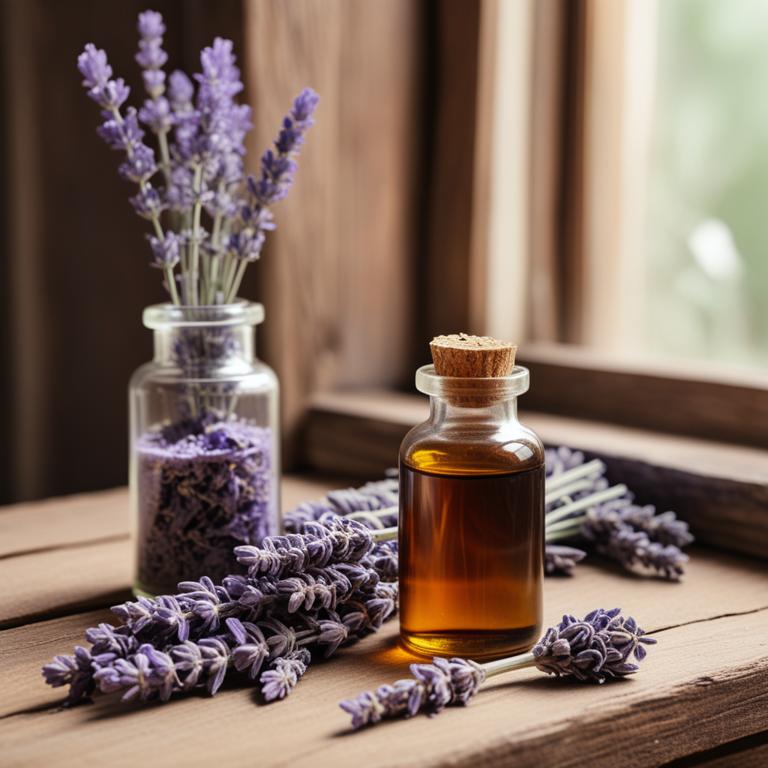
Lavandula angustifolia tinctures have been traditionally used to treat anxiety due to their calming and sedative properties, which help to alleviate stress and promote relaxation.
The bioactive constituents, including linalool and linalyl acetate, contribute to their anxiolytic effects by interacting with the body's GABA receptors and modulating the activity of neurotransmitters.
By using Lavandula angustifolia tinctures, individuals can experience reduced anxiety symptoms, improved sleep quality, and enhanced mood, ultimately leading to an improved overall sense of well-being.
The benefits of using these tinctures include their non-invasive nature, ease of use, and minimal risk of side effects, making them a popular natural remedy for anxiety relief.
Related Study
According to "Evidence-based complementary and alternative medicine : eCAM", Lavandula angustifolia tinctures for anxiety were found to be effective in significantly improving anxiety levels in patients with cardiovascular diseases, as shown in 31 studies out of the 52 papers reviewed in the systematic study.
5. Melissa officinalis tinctures
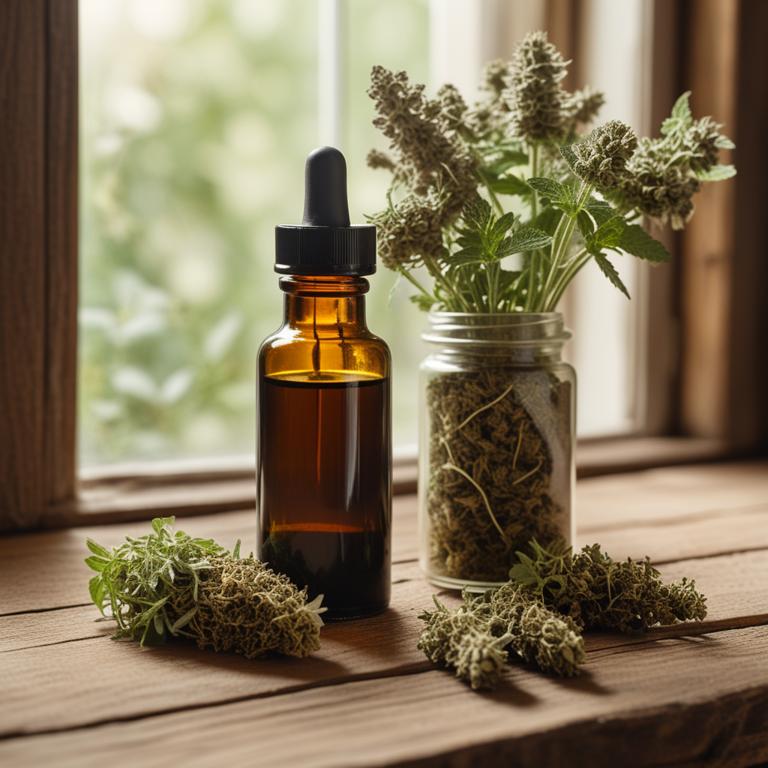
Melissa officinalis tinctures have been traditionally used to treat anxiety due to their adaptogenic and anxiolytic properties.
The herbal preparation helps to alleviate anxiety by promoting relaxation, reducing stress levels, and improving mood.
The bioactive constituents of Melissa officinalis tinctures, including linalool, linalyl acetate, and rosmarinic acid, contribute to its anxiolytic effects by modulating the activity of neurotransmitters and reducing inflammation in the brain.
Regular use of Melissa officinalis tinctures has been reported to provide relief from anxiety symptoms, promoting a sense of calmness and well-being.
Related Study
According to the study in "BMC complementary medicine and therapies", Melissa officinalis tinctures showed a statistically significant decrease in anxiety severity, with a significant difference in mean change of anxiety scores between the intervention and control groups (p = 0.04), indicating its potential efficacy in reducing anxiety.
6. Panax ginseng tinctures
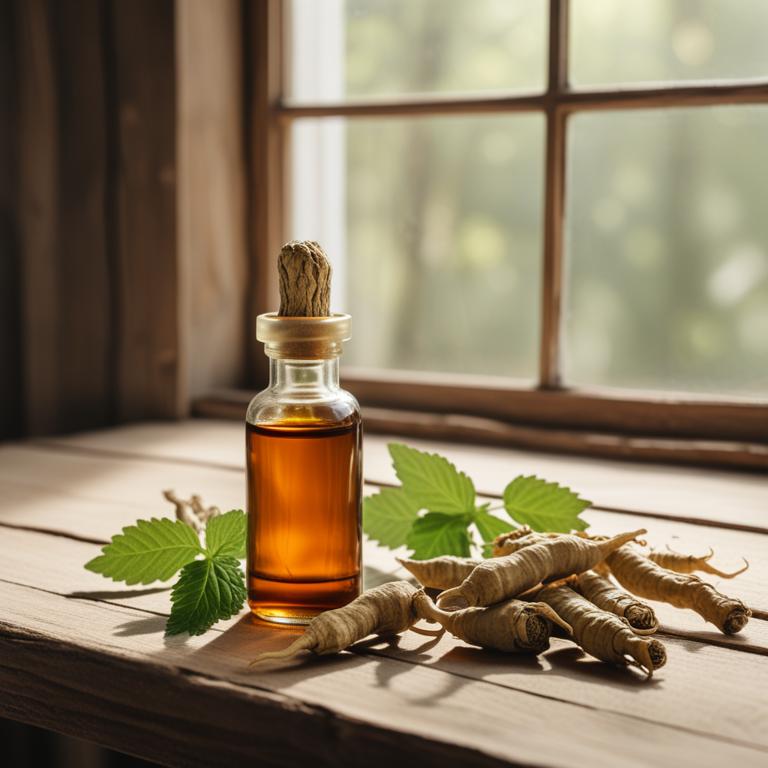
Panax ginseng tinctures have been traditionally used to treat anxiety by promoting relaxation and reducing stress levels.
The adaptogenic properties of this herbal preparation help the body to adapt to stressful situations, thereby reducing anxiety and improving mood.
The bioactive constituents, including ginsenosides, panaxynol, and panaxydol, have been found to have a sedative effect on the nervous system, thereby reducing anxiety and promoting a sense of calmness.
The benefits of using Panax ginseng tinctures to treat anxiety include improved sleep quality, reduced stress levels, and enhanced overall well-being.
Related Study
According to "Menopause (New York, N.Y.)", Panax ginseng tinctures for anxiety may be effective, but more research needs to be done.
7. Schisandra chinensis tinctures
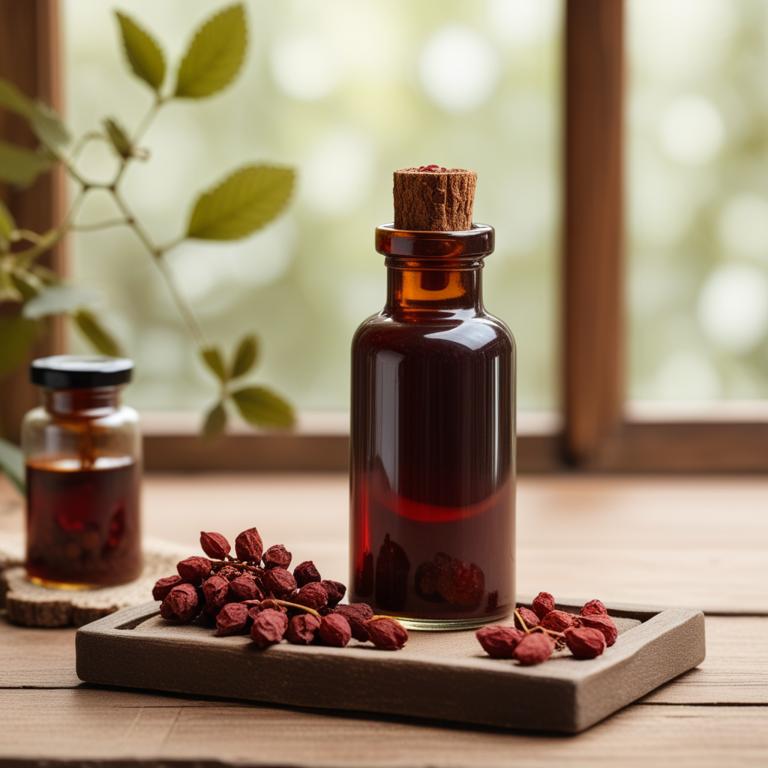
Schisandra chinensis tinctures have been traditionally used to treat anxiety due to their adaptogenic and anxiolytic properties, which help to reduce stress and promote a sense of calm.
The bioactive constituents of Schisandra chinensis, including lignans, alkaloids, and phenolic acids, are believed to contribute to its anxiolytic effects by modulating the activity of neurotransmitters such as GABA and serotonin.
By regulating the body's stress response and promoting relaxation, Schisandra chinensis tinctures can help alleviate symptoms of anxiety, including restlessness, irritability, and difficulty sleeping.
The benefits of using Schisandra chinensis tinctures to treat anxiety include improved mood, reduced stress levels, and enhanced overall well-being.
Related Study
According to "Nutrients", Schisandra chinensis tinctures for anxiety may interact with the gut microbiome, potentially mediating mental health benefits through increased abundance of health-beneficial microorganisms or anti-inflammatory effects.